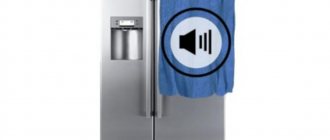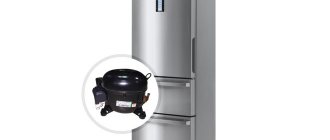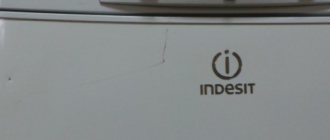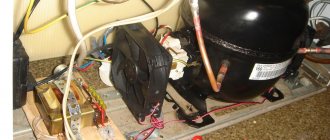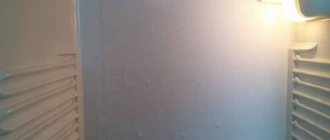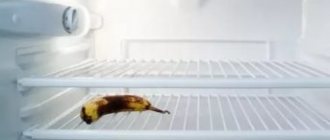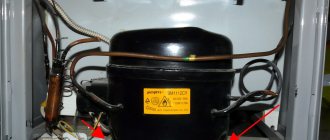When choosing a household assistant such as a refrigerator, people increasingly pay attention to its capacity and low energy consumption, but less and less often check the level of noise emitted. Of course, technology is constantly evolving and new models do not rumble at night, but a constant hum can bring a lot of irritation, interfering with quality rest.
During the day this is not felt so acutely, but at night various gurgling, buzzing and rattling noises can be disturbing. To protect yourself from unpleasant surprises, you need to understand the standards, increased noise of refrigerators and how to reduce it.
The compressor is the main cause of refrigerator noise
- 10.1. Incorrect installation
- 11.1. Rattling and ringing in refrigerators
- 18.1. Related articles:
In general, in a modern, working refrigerator, the motor emits a uniform hum. But its level varies. If we talk about two-compressor models, it may seem that they make twice as much noise, but this is not the case. The fact is that the power of each motor is less than one - in single-compressor models, so the noise level is lower.
This is where technology comes to our aid. Let's say the Koreans have been using linear inverter compressors for a long time. The noise level is promised as 38 dB. Compared to conventional motors, the Korean inverter is approximately 25% quieter, which is confirmed by European testing. We liked the new GR-H802HEHZ, which practically whispers even with full NoFrost.
The Sharp brand offers a unique evolution of inverters. The Japanese came up with such a thing as the J-Tech Inverter. The motor can operate in 36 stages and changes speed smoothly, without jumps. This makes operation very quiet. The promised noise level is 36 dB - here's a story about how the Japanese overtook the Korean. By the way, the same level applies to side-by-side form factor models. Incredible silence for these giants! Pay attention to the premium six-door flagship Sharp SJ-GF60AR – it’s simply a miracle of technology!
When it comes to high-tech compressors, these two brands are ahead of the curve. Even the Germans with multifunctional Liebherr equipment are only swallowing dust. The new two-chamber products, presented in 2021, are noisy at 42 dB (although in fact this is not much!). If this situation is not critical for you, pay attention to the Liebherr ECBN 5066 PremiumPlus BioFresh NoFrost model. This very smart machine perfectly preserves the freshness of everything delicious, while saving maximum energy.
Refrigerator compressor hums and won't start
If for a long time the refrigerator serves the owner faithfully, and one fine day its compressor starts to hum or stops freezing, you should seek help from professionals who will tell you the cost of repairing the refrigerator compressor and the time it will take.
The price of such a service is calculated based on the causes of the breakdown. And they can be different. For example, a pipe burst and freon leaked, the thermostat stopped working, or the motor burned out. The cause of such breakdowns is most likely the long-term continuous operation of the household appliance, which does not comply with the manufacturer’s recommendations.
The refrigerator must be turned off and defrosted immediately. If the problem does not disappear after defrosting, you should seek help from qualified specialists.
There are often cases when a previously properly functioning refrigerator stops turning on, begins to hum loudly during operation, or turns on and hums, but does not freeze. The probable cause of these phenomena is a short circuit that caused the fuses to overheat, as a result of which they blew. Replacing fuses, as well as determining the correct cause of a refrigerator malfunction, can only be done by a professional technician. Only a person with special skills will do this quickly and correctly.
The refrigerator turns off immediately after turning it on
In conclusion, I would like to talk about a case when repairing a refrigerator turns out to be the most expensive. This is a situation when the device’s motor overheats and burns out. In this case, when turned on, the household refrigeration appliance immediately turns off automatically. To fix the problem, turn off the refrigerator, let it cool and rest. Try turning it on again. There is a possibility that the problem is not a burnt-out engine at all, but just a power surge. When voltage surges are observed, the compressor of the device automatically turns off to avoid overheating. If it is reliably known that there are no voltage drops, but the refrigerator does not start or starts and immediately turns off, then this is a sure sign of a burnt-out motor and professional help is needed.
Refrigerator compressor fasteners as a cause of noise
Due to loose fastenings, you can also hear unpleasant noise, crackling, and the unit creaks. In this case, the motor seems to be shaking, not firmly fixed - it comes into contact with the walls of the housing and makes sounds that you mistake for a hum. How to remove noise in this case? Check the fasteners and tighten them if necessary.
Let's sum it up
This article answered a fairly common question: “Why is the refrigerator humming?” There are, of course, many reasons for this problem. Some of them are easy to fix yourself. We are talking about correct installation, loosening the compressor fastenings, and the formation of a thick layer of ice on the evaporator. However, a loud sound can also indicate serious damage. To solve these problems, it is better to turn to professionals. They will not only carry out diagnostics, but will also quickly replace certain parts if necessary. Service center employees provide the following services:
- Cleaning the filter.
- Replacing the start-up relay.
- Repair of burnt parts.
- Replacing the heating element.
We use the refrigerator every day and don’t think about its hard work all year round. But we remember its technical condition when we hear a hum during operation, sharp shocks or vibrations when starting and stopping the compressor. Even new refrigerators sometimes make a loud noise, but we will look at everything in order in this article. So, why does the refrigerator hum or rattle?
The main reasons why a refrigerator hums, besides problems with the compressor
- Fan blade. If your refrigerator is very noisy or loud, especially when the door is open, it could be the evaporator or condenser fan blade. First turn the evaporator fan blade by hand. If the fan blade does not rotate freely, then check to see if it is rubbing against something or if something is interfering with the blade. Also, check the condenser fan blade to determine if there is something obstructing it.
- Evaporator fan motor. When the evaporator fan motor fails, it often makes a lot of noise, especially when the refrigerator door is open. If the evaporator fan is noisy, replace it.
- Condenser fan motor. It is possible that something has become caught in the condenser motor fan blade, or the bearings in the condenser fan motor, which is usually located under the refrigerator near the back, may be faulty. Pull the refrigerator away from the wall and remove the access panel to get to it.
- Compressor. If the noise is coming from the compressor, this may be a sign of wear. As the compressor wears out over time, it begins to make more noise than usual. Compressors often continue to last for years after they become noisier. However, if your compressor is too noisy, then keep in mind that it most likely has a problem and will need a repairman to replace it.
- Water inlet valve. If your refrigerator is too noisy or loud, especially when the ice maker is filling, the water inlet valve may be faulty. The water inlet valve is an electrically controlled valve that opens to supply water to the refrigerator dispenser and ice maker. Over time, mineral deposits can build up inside the valve and restrict water flow. If the water inlet valve is very noisy or loud, replace it. Do not attempt to repair the water inlet valve yourself, as disassembling the valve may cause it to fail.
- The refrigerator is not installed correctly. This happens if, for example, the legs of a refrigerator are incorrectly fixed, and it is in a “suspended state.” This also often occurs if the unit is placed close to a rack, batteries and other objects that cause the refrigerator to vibrate and grind. Another reason that can be attributed to incorrect installation is that the distance between the refrigerator and the wall is too small. Due to this proximity, the motor does not have enough free space for air circulation, and the noise level increases. How can I make my refrigerator run quieter? Double-check its position and rearrange it if necessary.
- Malfunction of the electrical circuit. This malfunction occurs due to a relay failure. In this case, the unit does not behave quite normally: it growls, knocks, crackles, then abruptly turns off and does not start again for some time. A slightly burnt fan winding can also cause a network malfunction. The third reason for this situation: a burnt out motor motor.
- The refrigerator pipe filter is clogged. This entails a decrease in chamber cooling. First, pay attention to how the unit began to work in the last few hours. Then contact service.
- Weak shock absorbers. The noise is loudest at the very beginning, when the engine starts, and at the end, when it stops working. The shock absorbers will need adjustment.
- Motor wear. There are many manifestations of this problem. Let's start with the fact that when engine parts wear out, backlashes form. If you notice a strong knocking/crackling noise exclusively while the engine is running, do not write it off as an accident. A part not replaced in a timely manner can lead to serious damage - change the motor.
The refrigerator is loud: causes and solutions
We have collected typical problems and will tell you how to fix them. Among them are:
- Incorrect installation or misplaced location.
- Overheating due to lack of air.
- Problems with the fan.
- Electrical network problems.
- Fastenings are loose.
- Problems with shock absorbers.
Let's learn about each of them separately.
Installation rules violated
The refrigerator must be level! What does it mean? If the device is skewed, its parts may touch, be in an abnormal position, the weight of the compressor is incorrectly distributed, which is why the parts may rattle against each other.
To install the refrigerator correctly, you need to take a regular building level and set it so that the device is level in the horizontal plane. To adjust the position of the refrigerator, inspect its legs - they are usually adjusted in the same way as on other household appliances, for example, on washing machines.
To adjust them, lift the adjustable side of the device and unscrew the thumb leg to increase the height, or screw it to decrease it.
Lack of air
If the refrigerator is installed close to a wall, appliances or other furniture, there may be problems with it overheating. This may cause the compressor to overload and make loud noises.
On a note! There should be at least 5-10 centimeters of free space between the back wall of the refrigerator and the nearest wall. The same applies to the side walls of the device. So pay attention to this too. This problem is especially common in hot summers.
Fan problems
In addition to the compressor, No Frost refrigerators also have two fans. One of them drives cold air through the chambers. If it is worn out, it also makes cracking sounds, uneven sounds and tapping, whistling or humming. To determine the malfunction you need to get to the fan. It is located near the evaporator. This is a radiator that is installed behind the freezer. The second fan is needed to cool the compressor, so it is located next to it - at the bottom of the device.
First, you need to listen to which of the fans the noise is coming from, you won’t see it, since it’s covered by a panel, but we’ve already told you where each one is. Two reasons for fan noise:
- The grease on the bearings has dried out. The most common problem is that the fan first begins to make noise, and then may completely jam. Sliding bearings are installed in them, often these are brass bushings. The easiest option is to drip some motor oil into the contact area between the motor shaft and the bearing or spray it with WD-40 universal solution. If you drip too much, the oil will start to spread all over the surrounding walls. During normal repairs of electric motors, the bronze bushings are removed and replaced with new ones. Less often, they are lubricated with thick lubricant.
- Ice freezing on the evaporator. Then the fan simply touches the ice with its blades. In a normal case, there should be no ice; if there is, check the defrosting system; it consists of several temperature sensors, a control system (for example, an electromechanical timer) and a heating element. If the timer, control relay or heating element malfunctions, the ice is not removed. Also, when No Frost refrigerators operate for a long time, sometimes the ice is not completely removed during defrosting and gradually accumulates. Defrost it at least once a year.
Why is the new refrigerator humming?
According to GOST, the acceptable noise level from a working refrigerator is considered to be readings up to 55 dB. It's like talking in full voice - that is, not quietly. However, if you look at the characteristics declared by the manufacturer, most modern refrigerator models will have a figure of about 40 dB.
Note: when choosing equipment, look at the label that is pasted on the front of the unit. The energy consumption class, chamber volumes are indicated there, and the lowest figure is the treasured decibels. If the issue of peace is especially important to you, carefully compare the presented models and buy the one with the lowest noise level!
You chose just such a quiet model, but the refrigerator still hums like an airplane?
- First, check if the shipping bolts have been removed? They secure the springs on which the compressor is mounted. If you do not remove them, the springs will not begin to perform their shock-absorbing function, and the refrigerator will hum very loudly.
- Second, give the refrigerator time. It takes up to a week for the refrigerator to “freeze” completely and return to normal operation.
- Third, check that the refrigerator is installed correctly. Is it in contact with furniture or other objects that cause resonance and increase noise and hum? Remember: for normal operation of the refrigerator, you must always leave a gap of at least 5 centimeters from the objects surrounding it.
- Fourth, check that the refrigerator is loaded correctly. This advice is relevant for both new and long-used units! Perhaps some jars, pans, bottles are touching in the refrigerator and all this is ringing and resonating. In this case, just distribute the contents of the shelves a little differently.
- Fifthly, if the refrigerator growls only when the motor starts running, this is normal! When starting, the motor requires a large starting current to “start” the rotor - as a result, you hear a short growl.
If the shelves are in perfect order, and the refrigerator has been working for you for several years and you haven’t heard any particularly loud noises from it before, it means that some kind of problem has arisen, which the refrigerator is loudly announcing.
Transport bolts and compressor mountings
The compressor vibrates strongly during operation, and manufacturers, wanting to reduce the assembly time of devices, abandon bolts and use fastening by bending parts of the housing. This fastening is weakening. Experts recommend tightening the compressor mount, or even securing it additionally with wire or cable ties to reduce vibrations. If the fastening is bolted, try to tighten them.
On a note! When purchasing a new refrigerator, you need to carefully read the operating instructions - it should say that before turning the device on, you need to unscrew all the transport bolts of the compressor, because they can also lead to increased noise levels.
Dependence of noise level on refrigerator type
As it turns out, not all devices make the same noise. This issue can be approached from the point of view of the type of unit, which can be thermoelectric, compressor and absorption. In the former there is no noise at all, since there is no refrigerant or compressor in such refrigerators, and the latter are not very loud, but the absorption refrigerator operates noisily in constant mode - such devices do not have a compressor, but freon is used. It is the flow of refrigerant that creates the noise. And finally, the most common refrigerators - compressor ones, which are used everywhere in our everyday life, make the most aggressive noise of all. Moreover, everything can make noise - the compressor, the refrigerant flowing through the system pipes and other technologies. For example, in refrigerators with No Frost the fan may make noise. Therefore, if you are constantly wondering which refrigerator is not noisy, then there can only be one answer - a faulty one. But for lovers of silence there is always good news - you can find models with low noise levels, but you need to fork out a lot for them.
Correct determination of the reason: why the refrigerator is noisy
Before you panic when you hear a strange noise from your refrigerator, you need to focus on the sound and do your due diligence. To independently understand what to do if the refrigerator is noisy, first determine the nature of the sound. Based on its characteristics, you will find one of many reasons. For example, it could be a faulty refrigerator thermostat, which is why it constantly gets cold, since there is no response signal to turn off the compressor. During operation, a characteristic sound of freon circulation occurs, which gradually intensifies. With a cool head and rational thinking, there is a high probability of correcting any defects.
If, after trying all sorts of options, none of them fit the noise that disturbs the operation, and you cannot independently discover the cause of the loud sounds when the refrigerator is operating, then the best option would be to contact qualified technicians.
Additional causes of noise in refrigerators
If you are the owner of such a device as a built-in refrigerator, then you must understand that if you do not meet all the conditions for placing this refrigerator in furniture, it will “reward” you with a fair amount of noise. Moreover, according to the laws of physics, the built-in refrigerator will a priori operate louder than usual.
If you hear noise in the back wall of the refrigerator, and not a hum or rattling, but sounds similar to the flow of liquid, then you should not worry - you hear the process of refrigerant circulation. By the way, if the sound comes from the side wall, then remember that in many devices the evaporator is built not at the back, but on the side.
If the sound appears in the refrigerator or freezer and resembles rattling, then just check how you arrange the containers and dishes on the shelves - perhaps they are in contact with each other, which creates the sound.
How can you make a refrigerator quieter?
The sound of the refrigerator can only be reduced if the cause of the noise has been correctly identified.
Since often the source of annoying noise from the refrigerator is not a breakdown, you can try to independently determine the cause of the unpleasant sounds and eliminate it.
- Make sure that the unit is installed correctly, levelly, at a distance of at least 20 centimeters from each wall, and that other objects or furniture are not in contact with it.
- For a new refrigerator, make sure the shipping bolts are removed.
- If the refrigerator is made using “No Frost” technology, inspect the fans; their rotation should not be hindered by frost; if detected, it should be carefully removed.
- Carefully check the contents of the refrigerator to see if there is anything there that could cause unnecessary noise. You can try removing all products from the chambers and see how the level and nature of the sounds produced change.
- Remember that opening the door increases the temperature inside the chambers, so after closing the door, the motor runs harder for a while to reduce the temperature. A slightly increased noise level during this period is normal.
- Sometimes the problem of unpleasant sounds lies in the acoustics. Built-in refrigerators often make more noise. In the case of an ordinary refrigerator, it is worth trying to move it to another place - unpleasant sounds may disappear, especially if they were caused by resonance in the exhaust ducts or in voids inside walls and ceilings.
A clogged drain hole often causes noise. Use a syringe or fishing line to clean it.
Signs of a refrigerator malfunction
Now we move on to more serious breakdowns, when the refrigerator not only makes noise, but also does not start or works intermittently. In most cases, unfortunately, you cannot correct the situation with your own hands; only a specialist can help. Older refrigerators mainly suffer from such malfunctions:
- Compressor wear - after several years of operation, gaps (plays) form between parts, abrasion of pistons and fasteners occurs; in this case, the sounds cannot be confused with anything - they are constant and quite loud, they stop when the compressor-motor is turned off;
- loosening of the compressor fastenings - the part itself is in good condition, increased noise is observed at the beginning and end of the freezing cycle; the problem is solved quite simply - either by adjusting the compressor shock absorbers, or by completely replacing the spring fasteners;
- breakdown of the evaporator - a lattice structure on the back wall of a household appliance; in this case, the refrigerator makes noise, but does not freeze; It is difficult not to notice the problem; it is solved by replacing the failed part.
Design and operating features of the refrigerator
The main functional unit of the refrigerator is the compressor; it pumps freon through a capillary pipeline through the evaporator and condenser. The evaporator is a grille with a coil, which is located inside, usually on the back wall behind the freezer or around it; in “no-frost” systems it resembles the radiator of a car heater. With its help, heat is released into the environment.
It is almost impossible to imagine modern life without a refrigerator.
The condenser is located outside the refrigerator chambers; it can be open (as in old Soviet refrigerators), or it can be closed (as in some modern models). With its help, heat is released into the environment.
The compressor does not operate continuously, but periodically. The colder the temperature inside the cooling chambers is set, the more often and longer the compressor will operate. When starting the compressor, you may have noticed how the voltage in the network sags. This is accompanied by a short-term decrease in the brightness of incandescent lamps.
When it stops, you can often hear increased noise from the device, and in old Soviet models this noise and vibration sometimes develop into a real roar. This is due to the peculiarity of the compressor design - it is an electric motor that drives a piston similar to that used in internal combustion engines.
Such a design will inevitably vibrate, so rubber feet, hangers or springs are installed under the compressor. But what if the vibration is too strong? Let's find out!
How to find out the cause of noise in the refrigerator
To eliminate “mechanical” influence on the operation of the device, it is necessary to check the installation method of the unit for compliance with the basic requirements:
- The device must be level, securely, stable and without distortion.
- The minimum distance from the side wall of the device to surrounding objects (all) should be 6 cm.
- The gap on the rear wall side should be more than 7 cm.
- The shipping bolts that tighten the springs must be removed, and the shock-absorbing fastenings must be in good condition.
Let's look at what you can do and what you shouldn't do if your refrigerator is making a loud noise:
- First, you can inspect the inside of the chambers for rattling dishes, look under the freezer in search of excess frost on the walls, and check whether a foreign object has fallen behind the refrigerator. Move it a couple of centimeters away from the wall.
- Next, you can defrost the device to prevent the moving parts (fan) from touching the frozen ice. No Frost systems in most devices require a long shutdown (5-6 hours). Rinse the device thoroughly, transfer products from glass containers to plastic.
- You should not try to inspect the compressor of a running refrigerator, change its position, or disassemble a unit connected to the network.
- You should not leave the device turned on when it is determined that it has stopped freezing, the compressor motor does not start, especially if there is a smell of burnt insulation.
Various creaks, gurgles, clicks and some other sounds are characteristic of freezing units. Their origin is explained by the operation of a relay or thermal expansion/contraction of the materials of the device body. A serious increase in noise coming from the circulation unit is a reason to immediately call a technician to avoid leakage of toxic refrigerant.
It is not recommended to try to fix internal failures of the refrigeration unit on your own. Its correct maintenance requires theoretical and practical skills in handling special diagnostic and refueling equipment. The refrigerant circulating inside the devices, if leaked, can cause severe poisoning: it is dangerous to human and animal health, and the environment.
Fan problems
Why is the refrigerator humming, although it used to work quite quietly? A similar problem can occur in devices with a No Frost system. There is a loud sound due to a fan problem. When turned on, a hum, crackling, and rattling noise appears. This is felt most strongly in those models that have two fans installed. Each of them is separately responsible for cooling the freezer and refrigerator compartments.
What are the reasons for such a malfunction?
- Sudden temperature changes.
- Failure of the heating element.
- The evaporator is covered with a thick layer of ice.
- The grease has dried out on the motor bearings.
This problem is quite serious. However, before contacting specialists, you need to defrost the refrigerator. If this does not help, then you will have to return the device to a service center. Diagnostics will be carried out there, and based on its results, the necessary repairs will be made.
Refrigerator noise standards
The operation of any household appliance is accompanied by a certain level of noise. For a refrigerator, which is generally considered a fairly quiet device, the norm is between about 34 and 47 decibels, which can be compared, for example, with a wall clock, which produces a sound of about 30 decibels. Only their ticking does not have the character of a hum, and therefore does not tire the ear and nervous system.
The refrigerator has its own sounds, each of which has its own reason. Why does the refrigerator make noise during normal operation?
- smooth noise of the motor-compressor, which is usually heard as a soft rumble, sometimes rustling, but not loud, within 25 decibels;
- in new models of Indesit, Samsung and Liebherr refrigerators you can notice a characteristic sound reminiscent of the noise of wind in a pipe, and sometimes a whistle - this is a high speed of refrigerant circulation in the capillaries;
- the noise level from the activation of the starting relay under normal conditions does not exceed the already mentioned 30 decibels, although for a modern refrigerator this is even too loud;
- the characteristic hum of fans is a sign of the operation of the NoFrost system, and here it is possible to increase the noise level to 47 decibels, typical for Samsung, sometimes Minsk and Atlant refrigerators.
We have listed the main “healthy” sounds that are characteristic of the operation of a working refrigerator. This noise is within hygienic limits - at least 20, but not more than 50 decibels; most working refrigerators produce noise of no more than 42 decibels.
Why is the refrigerator noisy?
When the refrigerator is operating normally, it makes certain sounds. In its operating system, these sounds are determined by several factors. One of them is the compressor, which hums slightly during operation, and the second factor is the circulation of the refrigerant through the capillary and radiator tubes.
Types of noise
You can find out what exactly causes a suspicious sound by simply listening to it. Depending on the nature of the sound, noise can come from the following phenomena:
- A faint humming sound means the compressor is starting up and running.
- The sounds of plastic cracking are heard - this is the thermal expansion of tubes that pass from one area of technology to another through plastic walls. Often the refrigerator creaks loudly precisely because of the friction of the expanding tubes against the plastic elements.
- Hum or noise in No frost refrigerators. Such sounds are often produced by a fan that circulates cold air throughout the interior of the equipment.
Electric shock: first aid and consequences
Based on the type of noise in the refrigerator, the cause of its occurrence is determined. It is important to learn to distinguish between the noise of a technical factor or a natural physical process. This will help not only you understand the situation, but also correctly explain everything to the master. Although often the noise problem can be eliminated with your own hands.
Often the cause of the noise can be eliminated with your own hands.
Two-tariff meters - what is the price of a modern electric meter?
Eliminating noise in the refrigerator
Incorrect installation
The situation is simple and common - you purchased a new refrigerator, installed it in the kitchen, but the noise from it is like the old one. What's the matter? The reason is simple: you might not have checked the horizontal and vertical position of the refrigerator body. Due to the misalignment, the compressor may make noise when the housing comes into contact with the pipeline or metal parts of other components. Or it may be that one of the adjustable legs of the refrigerator, due to skew, simply hangs in the air, and due to insufficient support, the body of the unit vibrates and makes unpleasant noises.
Remedy: How to reduce noise in this case? The position of the refrigerator is set using a regular spirit level (building level). If it is not there, use a plumb line, which can be made from any thread and a weight weighing 20-50 grams. But even with a strictly vertical/horizontal position of the body, check the points where the legs touch the floor. Perhaps the floor is uneven, and the leg that hangs in the air will have to be adjusted - for this purpose the legs are equipped with threads.
Compressor lack of air
Quite loud noise from the refrigerator due to the fact that the compressor is operating in limited capacity mode is the second most common cause of elimination. This is especially true for small apartments or apartments filled with furniture.
If you have moved the refrigerator too close to the wall; if the refrigerator is furnished with furniture moved close together; if the back of the case (radiator) touches the wall or is too close to it, then air access to the condenser is difficult. Therefore, it is not cooled enough, creating an additional load on the compressor, which, in turn, begins to make noise due to overloads - valves knock, the engine vibrates, transmitting vibrations to other components. In addition, a layer of ice gradually accumulates on the condenser, which can also touch other parts of the structure and make noise.
Elimination: In such a situation, you can reduce the noise of the refrigerator in understandable ways - move the unit away from the wall at least 20 cm, remove furniture or other objects that are too close, and also clean the back wall of the refrigerator. Remove the layer of dust, remove dirt from the compressor, condenser, radiator and pipeline, defrost the refrigerator so that the ice on the condenser (if any) can be removed. It is advisable to carry out preventive maintenance work on the refrigerator at least once a month. All this can be done on your own, without the help of a professional refrigeration specialist.
Poorly secured compressor
What should you do if the refrigerator makes noise or extraneous sounds constantly, but all of the above methods do not help? Check that the compressor is securely in place.
Elimination: In older models, the compressor is suspended on springs - their weakening or displacement to the side can cause noise from the contact of the engine housing with the metal of other parts. The pipeline from the refrigerator to the radiator is a good sound resonator. The refrigerator hums very loudly if the rubber gaskets under the compressor housing are leaky - they are crushed or burst. Springs or gaskets need to be replaced.
Fan faults
If the unit is very noisy, check that the refrigerator fans are working properly. This only applies to models with the “No Frost” system – they can even have two fans installed. One is for cooling the evaporator of the refrigerator compartment, the second is for cooling the evaporator of the freezer.
Your refrigerator is noisy – what should you do to find the cause? With constant temperature fluctuations, the grease in the electric motor bearings dries out, and the refrigerator makes a loud noise from the vibrations of the fan. Also, ice on the evaporator, which can form as a result of poor performance of the heating element or its breakdown, grows over time, and the fan blades begin to cling to it, and the refrigerator begins to hum strongly.
Remedy: First, get rid of the ice crust on the evaporator - you can do this yourself. Then check for grease in the fan bearings and add it. The bearings will most likely be bronze or brass, so lubrication is very necessary.
Electrical faults
The next reason why your refrigerator began to make extraneous noise is an electrical malfunction.
If the start-up relay fails, the refrigerator behaves aggressively - when turned on, it makes a strong hum, growls, and after a few seconds it abruptly turns off.
Solution: replacing the relay - for this you will have to use the services of a professional if you cannot do it yourself.
The windings of the fan motor were burnt - another reason why the refrigerator began to make a lot of noise when turned on.
Remedy: check the windings with a tester for short circuit or leakage of resistance to the motor housing. In both the first and second cases, the engine will have to be changed. Although there are cases when, if there is a leak on the housing, it is enough to dry the engine thoroughly, and the infinite resistance will be restored.
Another reason why the refrigerator is making noise is that the compressor motor is burnt out. You can check this by touching the body. You can rest your hand on a working compressor - it is not too hot, just warm. If the housing is overheated, then you need to check the engine.
Eliminating the cause of the noise: Same as with the fan. But it will not be possible to dry the engine - it is pressed into the compressor, therefore - only replacement.
The evaporator heating element has burned out - this is the next reason why the refrigerator is noisy. Ice on the surface of the evaporator interferes with the normal operation of the compressor - in high load mode the noise from the engine will be loud.
This is why the refrigerator hums - the position of the valves and piston is disturbed, but the crankshaft continues to rotate, causing the refrigerator to make grinding and clanging sounds.
Troubleshooting: Check the heating element for serviceability - this can be done by testing the circuit with a continuity tester for a break. If the heating element burns out, you can replace it yourself.
Clogged pipeline
What to do if the refrigerator continues to make noise and what else could be the problem? Usually the throttle and filter of the unit become clogged. This is expressed in a decrease in cold production and an increase in the load on the compressor, which is why the refrigerator and the compressor make noise and knock.
Elimination: Just call the refrigerator, since special equipment is needed to remove the blockage.
Excess refrigerant
Why is the refrigerator knocking? When filling the unit's pipeline with refrigerant (this may be necessary), the refrigerator may mistakenly add an excess amount of freon. This will lead to a noticeable reduction in cold production performance, but this problem can easily be solved by bleeding the refrigerant.
In such cases, you just need to watch how the refrigerator works for 2-3 hours and ask the technician (if necessary) to bleed off the refrigerant.
Installation rules violated
The most common reason why a refrigerator starts to hum is due to improper installation. No matter how strange it may sound, it is precisely the violation of recommendations in this matter that can even lead to problems at work. When installing the device in a new location, be sure to check the correct vertical and horizontal position. If there is even a slight misalignment, it is reflected in the operation of the compressor - an unpleasant noise occurs. It is also important to check that the refrigerator is stable on all four legs. If the support is not enough, vibration and a loud hum will appear. Most manufacturers use adjustable feet, which make it easy to level the device. If there is no special construction device, then you can make a plumb line yourself. To do this you will need a thick thread and a weight. The latter is tied at one end, and the other is held in the hands. In this way it is easy to check the correct vertical position.
Other refrigerator sounds
Rattling and ringing in refrigerators
Most often, strange sounds are caused by poorly tightened bolts securing parts inside the refrigerator body. Both the compressor and various plastic parts can rattle, ring, crackle, crunch, or rumble. To eliminate noise, you can try to level the equipment. The reason for the rattling may lie in the skew of the device or its location close to other furniture.
Knocks in refrigerators
When stopping the engine on loose mounts and shock absorbers, you can hear a single or serial knock. It occurs due to repeated impact of the motor against the walls of the refrigerator.
Gurgling in refrigerators
Basically, gurgling indicates that the refrigerator is working properly. But if the compressor is silent, most likely the device has a breakdown in the freon tube. Therefore, you can hear the air gurgling with residual refrigerant, sometimes the process is accompanied by quiet pops and crackling sounds.
Clicking noises in refrigerators
These sounds can also be considered standard if they are heard from the very beginning of the refrigerator’s operation. Most often they occur when the thermostat is turned off or off, or after a freeze cycle. Crackling and clicking noises are produced by plastic and sometimes metal parts of the case.
However, these sounds may also indicate a device failure:
- If the thermostat is faulty. The relay clicks are heard, but the compressor does not start.
- If the compressor breaks down. There is a short click, after which the engine starts, which immediately stalls. The lights in the cells are on.
- Burnt out start protection relay. Repeated clicks in complete silence. The engine does not start, the light is on.
- Sometimes the clicking noise occurs when the motor stops. In this case, the problem may come from the compressor mounts. They are developed, and the motor hits the walls of the refrigerator body.
- Another reason for clicking sounds is power surges. Because of them, the automatic protection is triggered and the start-up relay may turn on. It will make a sound.
Cracking and squeaking in refrigerators
Have you encountered that your refrigerator is cracking or creaking or making unusual noises? This phenomenon may indicate a device failure:
- The electric motor creaks and knocks, indicating a high level of wear and failure in the near future.
- The freezer fan touches the ice, causing a characteristic creaking and crackling sound.
- Your refrigerator is not level, causing any parts of the device to rub against each other and crack.
- The grinding noise comes from the plastic walls of the housing, which contract or expand when the temperature in the kitchen changes.
Whistling and hissing in refrigerators
Often, owners of refrigeration devices are concerned that the equipment whistles or hisses.
The main cause of the whistling sound is the fan. The No Frost cooling system implies the presence of a cooler that distills cold air masses. In some cases, the fan blades may become covered with an icy layer, which is why extraneous sounds occur. In this situation, defrost should be carried out. If you still hear a whistle after defrosting, you need to lubricate the cooler with spindle oil. This is a machine tool that is resistant to low temperatures.
Also, a whistle may occur when freon circulates through the system. This is usually a normal situation. You can hear gurgling, gurgling and other unclear sounds. Environmentally friendly freon circulates faster in the system, which is why the whistle is heard.
There are certain parts in the refrigerator that can cause the appliance to whistle. More details: https://frizkazan.ru/a222705-svist-pri-rabote.html
Let's understand what causes such noise:
- Hissing, howling or gurgling can be a consequence of the rapid movement of freon in the capillary system.
- The circulation tubes are clogged or worn out.
- Debris has gotten between the blades of the fan mechanism.
The electric motor makes a characteristic whistle, indicating a malfunction.
When you can’t eliminate the noise yourself, what should you do?
You can initially empty the refrigerator and check it for noise. Even if it still persists, then look for reasons further.
If the refrigerator is installed correctly, if it makes unpleasant and loud sounds, even when empty, if the unit has been working flawlessly for a long time, but suddenly a clanging, hissing or hum appears, then this most likely indicates a serious malfunction, especially when the unit does not turn on , but it makes noise.
Do not neglect the services of specialists, as they can accurately indicate the reasons and quickly solve problems.
Note! In this case, you should contact a specialized service center to find and eliminate the cause of the problem.
If your refrigerator is still under warranty, then you should not try to repair it yourself, as intervention will remove the free service.
The compressor, electric motor, fans or seals may need to be repaired or replaced. If the refrigerator is under warranty service, you need to contact a representative of the manufacturer and find out the address of the organization where they can carry out high-quality repairs.
Video: LG GA-E499ZAQZ refrigerator - compressor hum (noise)
Refrigerator LG GA-E499ZAQZ hum (noise) of the compressor (see in headphones)
Watch this video on YouTube
Do you want to understand better than others?
- Frost on the refrigerator compressor tube. Problems with freezing of the compressor evaporator on a refrigerator - How the refrigerator works. Freezing on the shelves or walls of the refrigerator means that the temperature inside the refrigerator is too low. Model specifications…
- It is better to choose and buy a refrigerator with what type of compressor. Features and principle of operation of an inverter compressor in a refrigerator - What are they? Most modern refrigerators are equipped with piston compressors that are powered by electric motors with a vertical shaft. Most often the compressor...
- Which refrigerator compressor is better: principle of operation, how it works, what’s inside, what types there are. Choosing a refrigerator compressor - The history of the invention of the refrigeration compressor The history of modern vapor compression refrigeration machines begins, as is commonly believed, on August 14, 1834, when the English...
- Overheating of the refrigeration machine compressor: causes and protection against overheating. Reasons for heating the refrigerator compressor - Heat exchange in the refrigerator In general, everyone knows that signs of malfunctions often lead to disruption of processes associated with heat exchange between the corresponding ...
- Replacing the compressor in the refrigerator. Do-it-yourself repair and replacement of a refrigerator compressor - Design of a refrigerator compressor A fundamental physical rule also applies in everyday life: heat is transferred from a body with a higher temperature to a body that is less heated. To happen...
Types of sounds
Sometimes you may hear suspicious loud noises coming from the refrigerator that you have not heard before. These sounds can come from different modules. The main thing is to understand that this noise appeared as a result of a breakdown, and not the stable operation of household appliances.
It is also worth considering the fact that each specific model may have its own specific noises that cannot be found in other devices. This is due to the design features of different devices and their functionality.
You need to understand that with working equipment you can hear a quiet hum from the operation of the compressor. In this case we are talking about a strong noise that can be identified as a powerful hum.
On new technology, a hum occurs:
- Due to overtightened transport bolts. They hold the compressor during transport. If they are not removed, the engine will begin to make a loud noise when starting.
- Due to incorrect installation. The refrigerator begins to “growl”, both at high notes and at low notes, if it is tilted to one side. In this position, the compressor is in a skewed state and begins to hum.
- In some cases, a hum may occur due to a clogged refrigerant pipe or an overdose of freon after repairs have been carried out. The compressor cannot move the refrigerant through the system in full, resulting in increased load on the engine. There is a hum.
